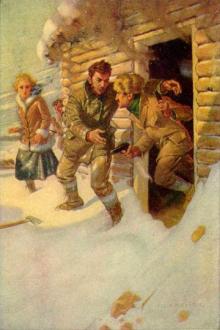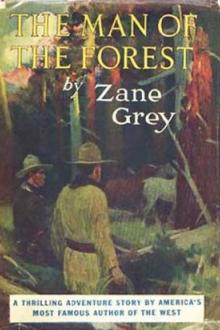Astoria; Or, Anecdotes of an Enterprise Beyond the Rocky Mountains by Irving (top romance novels .TXT) 📗

- Author: Irving
Book online «Astoria; Or, Anecdotes of an Enterprise Beyond the Rocky Mountains by Irving (top romance novels .TXT) 📗». Author Irving
When the general horror and dismay was at its height, the Blackbird himself was struck down with the malady. The poor savages, when they saw their chief in danger, forgot their own miseries, and surrounded his dying bed. His dominant spirit, and his love for the white men, were evinced in his latest breath, with which he designated his place of sepulture. It was to be on a hill or promontory, upwards of four hundred feet in height, overlooking a great extent of the Missouri, from whence he had been accustomed to watch for the barks of the white men. The Missouri washes the base of the promontory, and after winding and doubling in many links and mazes in the plain below, returns to within nine hundred yards of its starting-place; so that for thirty miles navigating with sail and oar the voyager finds himself continually near to this singular promontory as if spell-bound.
It was the dying command of the Blackbird that his tomb should be on the summit of this hill, in which he should be interred, seated on his favorite horse, that he might overlook his ancient domain, and behold the barks of the white men as they came up the river to trade with his people.
His dying orders were faithfully obeyed. His corpse was placed astride of his war-steed and a mound raised over them on the summit of the hill. On top of the mound was erected a staff, from which fluttered the banner of the chieftain, and the scalps that he had taken in battle. When the expedition under Mr. Hunt visited that part of the country, the staff still remained, with the fragments of the banner; and the superstitious rite of placing food from time to time on the mound, for the use of the deceased, was still observed by the Omahas. That rite has since fallen into disuse, for the tribe itself is almost extinct. Yet the hill of the Blackbird continues an object of veneration to the wandering savage, and a landmark to the voyager of the Missouri; and as the civilized traveller comes within sight of its spell-bound crest, the mound is pointed out to him from afar, which still incloses the grim skeletons of the Indian warrior and his horse.
CHAPTER XVII. Rumors of Danger From the Sioux Tetons.—Ruthless Character of Those Savages.—Pirates of the Missouri.—Their Affair with Crooks and M’Lellan.—A Trading Expedition Broken Up.— M’Lellan’s Vow of Vengeance.—Uneasiness in the Camp.— Desertions.-Departure From the Omaha Village.—Meeting With Jones and Carson, two Adventurous Trappers.—Scientific Pursuits of Messrs. Bradbury and Nuttall.—Zeal of a Botanist.—Adventure of Mr. Bradbury with a Ponca Indian.— Expedient of the Pocket Compass and Microscope.—A Messenger From Lisa.—Motives for Pressing Forward.
WHILE Mr. Hunt and his party were sojourning at the village of the Omahas, three Sioux Indians of the Yankton Alma tribe arrived, bringing unpleasant intelligence. They reported that certain bands of the Sioux Tetons, who inhabited a region many leagues further up the Missouri, were near at hand, awaiting the approach of the party, with the avowed intention of opposing their progress.
The Sioux Tetons were at that time a sort of pirates of the Missouri, who considered the well freighted bark of the American trader fair game. They had their own traffic with the British merchants of the Northwest, who brought them regular supplies of merchandise by way of the river St. Peter. Being thus independent of the Missouri traders for their supplies, they kept no terms with them, but plundered them whenever they had an opportunity. It has been insinuated that they were prompted to these outrages by the British merchants, who wished to keep off all rivals in the Indian trade; but others allege another motive, and one savoring of a deeper policy. The Sioux, by their intercourse with the British traders, had acquired the use of firearms, which had given them vast superiority over other tribes higher up the Missouri. They had made themselves also, in a manner, factors for the upper tribes, supplying them at second hand, and at greatly advanced prices, with goods derived from the white men. The Sioux, therefore, saw with jealousy the American traders pushing their way up the Missouri; foreseeing that the upper tribes would thus be relieved from all dependence on them for supplies; nay, what was worse, would be furnished with fire-arms, and elevated into formidable rivals.
We have already alluded to a case in which Mr. Crooks and Mr. M’Lellan had been interrupted in a trading voyage by these ruffians of the river, and, as it is in some degree connected with circumstances hereafter to be related, we shall specify it more particularly.
About two years before the time of which we are treating, Crooks and M’Lellan were ascending the river in boats with a party of about forty men, bound on one of their trading expeditions to the upper tribes. In one of the bends of the river, where the channel made a deep curve under impending banks, they suddenly heard yells and shouts above them, and beheld the cliffs overhead covered with armed savages. It was a band of Sioux warriors, upwards of six hundred strong. They brandished their weapons in a menacing manner, and ordered the boats to turn back and land lower down the river. There was no disputing these commands, for they had the power to shower destruction upon the white men, without risk to themselves. Crooks and M’Lellan, therefore, turned back with feigned alacrity, and, landing, had an interview with the Sioux. The latter forbade them, under pain of exterminating hostility, from attempting to proceed up the river, but offered to trade peacefully with them if they would halt where they were. The party, being principally composed of voyageurs, was too weak to contend with so superior a force, and one so easily augmented; they pretended, therefore, to comply cheerfully with their arbitrary dictation, and immediately proceeded to cut down trees and erect a trading house. The warrior band departed for their village, which was about twenty miles distant, to collect objects of traffic; they left six or eight of their number, however, to keep watch upon the white men, and scouts were continually passing to and fro with intelligence.
Mr. Crooks saw that it would be impossible to prosecute his voyage without the danger of having his boats plundered, and a great part of his men massacred; he determined, however, not to be entirely frustrated in the objects of his expedition. While he continued, therefore, with great apparent earnestness and assiduity, the construction of the trading house, he despatched the hunters and trappers of his party in a canoe, to make their way up the river to the original place of destination, there to busy themselves in trapping and collecting peltries, and to await his arrival at some future period.
As soon as the detachment had had sufficient time to ascend beyond the hostile country of the Sioux, Mr. Crooks suddenly broke up his feigned trading establishment, embarked his men and effects, and, after giving the astonished rear-guard of





Comments (0)